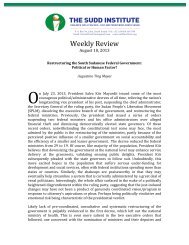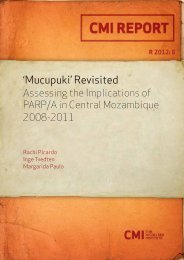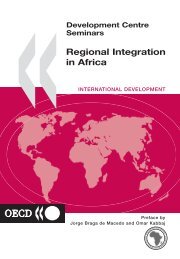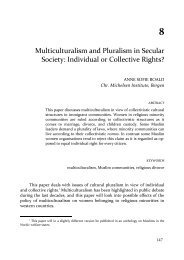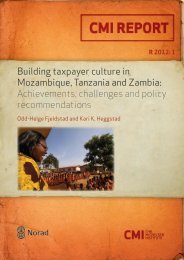WTO/GATS and Economic Development: Key to "the new ... - CMI
WTO/GATS and Economic Development: Key to "the new ... - CMI
WTO/GATS and Economic Development: Key to "the new ... - CMI
Create successful ePaper yourself
Turn your PDF publications into a flip-book with our unique Google optimized e-Paper software.
3.2 Summary of individual project results issue A: The adoption of ICT <strong>and</strong><br />
its impact on supply chain management<br />
A1 Trust, trade networks <strong>and</strong> telecommunication development (Overaa)<br />
This project studies how traders in Ghana make use of better access <strong>to</strong> telephones, which<br />
came about as a result of liberalization of <strong>the</strong> telecom sec<strong>to</strong>r in 1995. By 2003 Ghana’s teledensity<br />
had increased from 0.3 <strong>to</strong> 1.3 mainlines per 100 persons <strong>and</strong> four mobile phone<br />
companies had 600,000 subscribers. Prepaid GSM services are slowly becoming more<br />
affordable <strong>and</strong> thous<strong>and</strong>s of small communication centers <strong>and</strong> public phone boots have been<br />
established. Never<strong>the</strong>less, access <strong>to</strong> telecom services is still markedly biased in favor of urban<br />
areas <strong>and</strong> higher income groups.<br />
Based on qualitative fieldwork in Accra in 2001 <strong>and</strong> 2003 – a time span over which<br />
considerable change could be observed – <strong>the</strong> impact of access <strong>to</strong> <strong>new</strong> communication <strong>to</strong>ols on<br />
<strong>the</strong> business practices of traders in cloth, fish <strong>and</strong> agricultural produce was investigated.<br />
Focus was on <strong>the</strong> extent <strong>to</strong> which <strong>the</strong> use of telecommunication technology reduces traders’<br />
time <strong>and</strong> transportation costs, <strong>and</strong> its impact on <strong>the</strong> way in which relationships of trust in trade<br />
networks are initiated <strong>and</strong> maintained. Approximately 10 key informants (managers of<br />
telecom companies, mobile phone dealers, truck drivers, etc.) <strong>and</strong> 100 small- <strong>and</strong> large scale<br />
traders (with <strong>and</strong> without phones) were interviewed. The data are presented as case studies of<br />
individual traders <strong>and</strong> trade networks. The points below summarize <strong>the</strong> main findings:<br />
• Substitution of travel with calls in order <strong>to</strong> exchange information (i.e. on prices,<br />
supply <strong>and</strong> dem<strong>and</strong>) considerably reduces traders’ time <strong>and</strong> transportation costs.<br />
• Particularly benefiting are traders, who a) co-ordinate large networks, b) operate over<br />
long distances <strong>and</strong> c) trade in commodities where detailed information on quality <strong>and</strong><br />
design is required.<br />
• Mobile phones enable traders <strong>to</strong> provide <strong>the</strong>ir cus<strong>to</strong>mers with better services (i.e.<br />
information on quality, quantities, prices, supplies, timing <strong>and</strong> availability around <strong>the</strong><br />
clock). These major competitive advantages are only effective in relation <strong>to</strong> trade<br />
partners <strong>and</strong> cus<strong>to</strong>mers who also have phones<br />
• Limited mobile phone coverage <strong>and</strong> fixed line network in rural areas severely limits<br />
<strong>the</strong> returns for traders in agricultural produce of investing in mobile phones. Traders in<br />
cloth, whose cus<strong>to</strong>mers are often urban <strong>and</strong> middle/high income earners, are <strong>the</strong>refore<br />
more likely <strong>to</strong> actively use phones than traders in agricultural produce.<br />
• Traveling traders, who frequently experience crime <strong>and</strong> accidents while on <strong>the</strong> road,<br />
find that mobile phones are good security investments – reducing transaction costs in a<br />
risky economic environment.<br />
• Risks of <strong>the</strong>ft, payment default <strong>and</strong> embezzlement can be reduced when large money<br />
transactions, hi<strong>the</strong>r<strong>to</strong> h<strong>and</strong>ed over in large piles of cash, are replaced with bank<br />
transfers moni<strong>to</strong>red through phone calls. This <strong>new</strong> mode of transacting – clearly<br />
enhancing trust between exchange partners – is generally still not common, but was<br />
found <strong>to</strong> be institutionalized between wholesalers <strong>and</strong> importers of frozen fish.<br />
• Moni<strong>to</strong>ring intermediaries’ movements <strong>and</strong> transactions can be improved through<br />
frequent long-distance mobile phone calls. But for initial contact <strong>and</strong> elaborate<br />
contract negotiations, face-<strong>to</strong>-face communication <strong>and</strong> observation of behavior is<br />
required before trust can be established.<br />
4



